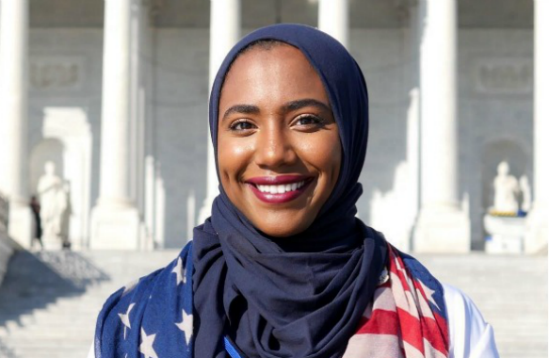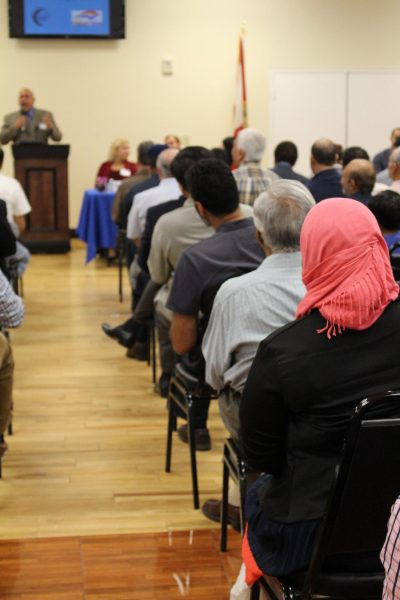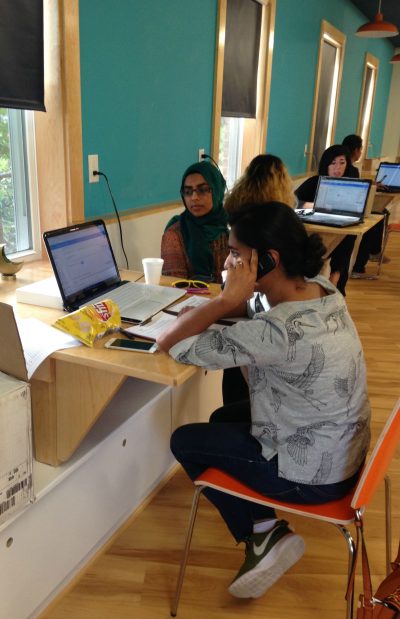
Remaz Abdelgader is the phone bank manager for the Virginia chapter of Emerge USA, an organization promoting Muslim civic engagement.
Equipped with burner phones and laptops, the volunteers took their seats. A dozen voices echoed around the Muslim community space in Alexandria, Virginia, as they cold-called phone numbers from a database. “As-salamu Alaikum,” read the traditional Arabic greeting in their script.
“Are you planning on voting in the upcoming election?” Farheena Mustafa, 22, asked the person on the other line. A recent University of Virginia graduate, Mustafa came to the phone-banking event with two of her sisters.
They came to mobilize Muslim voters, even though Donald Trump may well do that on his own. The Republican presidential nominee has proposed banning Muslim immigration to the United States. He has accused Muslim Americans of harboring terrorists, and he has insulted the Muslim parents of a fallen American soldier. Just a few hours south in Virginia, one of Trump’s steadfast supporters, Liberty University Chancellor Jerry Falwell Jr., has suggested concealed-carry weapons may be the solution to “end those Muslims,” only later clarifying that he meant terrorists.
In northern Virginia, though, the phone bank was about getting out the vote, not telling people how to vote. Still, it was hard to escape Trump.
Some people will say, “We don’t want Trump to win,” Remaz Abdelgader, the phone bank manager, warned the group. “As non-partisans, we can’t endorse someone. So we’ll just listen. If they sound really passionate, ask them if they want to volunteer. That’s where they can put their passion.”
The event, held on a Sunday in September, was a collaboration between Emerge USA, a nonprofit promoting Muslim civic engagement, and MakeSpace, a Muslim community organization geared toward young professionals. Emerge USA’s nonprofit status forbids politicking, though its other arm, a PAC, funds candidates and one of its board members, Farooq Mitha, is Hillary Clinton’s Muslim outreach director. While the phone-banking stays neutral, Abdelgader, 23, knows that most of her volunteers come because they do not want Trump to win on November 8. “That’s the mentality and what drives people,” she said.
Emerge USA’s efforts are part of a larger wave of Muslim American activism this election cycle. A coalition of groups has pushed to register one million new Muslim voters, spearheaded by the U.S. Council of Muslim Organizations (USCMO). This summer during Ramadan, when mosque attendance tends to be highest, volunteers around the country handed out flyers and staffed voter registration tables outside Islamic centers. This fall, activists have continued holding voter education workshops, phone banks, and candidate forums, and USCMO created a National Muslim Voter Registration Day to coincide with Eid Al-Adha, one of Islam’s holiest festivals.
“This appears to be the most important election for the American Muslim community,” said Robert McCaw, the director of government affairs at the Council on American-Islamic Relations (CAIR), which is a USCMO member organization. “Never before have we been so front and center when it comes to political rhetoric—especially against the community.” He said voter registration has become “one of our community’s highest priorities.” As of June, CAIR estimated there were 824,000 likely registered Muslim voters, up 300,000 since the last presidential election.

(Photo courtesy of Emerge USA) Muslim Americans attend a town hall with lawmakers in Longwood, Florida.
The American Muslim population is small but growing; by some estimates it counts for no more than 1 percent of the total U.S. population. But activists are pushing for a high turnout from Muslim voters in key swing states with sizeable Muslims populations, including Michigan, Florida, Ohio, Pennsylvania, and Virginia. There is room to grow: Muslim Americans lag behind other faith groups in voter registration; only 60 percent are registered to vote, compared to 86 percent of Jews and more than 94 percent of Christians, according to the Institute for Social Policy and Understanding.
For new citizens, the challenge can be conveying the importance of voting, and that each vote counts. Dar Al-Hijrah Islamic Center is a large mosque in Falls Church, Virginia, that has become the religious home to many asylum seekers and refugees. “Most of the countries our population comes from have governments that are incredibly dysfunctional, if not in the middle of a civil war,” said Colin Christopher, Dar Al-Hijrah’s deputy director of government affairs. “The idea of civic engagement is different. They see government as corrupt and dangerous.” This year, the mosque has held frequent voter and government education sessions, in an effort to counter that message and get the community engaged.
It wasn’t long ago that many Muslim Americans were thought to be a natural Republican constituency. One of the most racially diverse faith groups in the U.S., they defy easy categorization. They include the socially conservative and the politically liberal, the native-born and the immigrant. For many first-generation Muslim Americans, their heritage spans the globe, from South Asia to the Middle East and North Africa. George W. Bush actively campaigned for Muslim voters, and he won their vote in 2000—a feat given that nearly a third of Muslims in the U.S. are African American, and reliably Democratic voters. Days after 9/11, Bush visited a mosque in Washington, and famously said, “The face of terror is not the true faith of Islam. That’s not what Islam is all about. Islam is peace.”
But post-9/11 wars and policies prompted Muslims voters to retreat from the GOP. According to Georgetown/Zogby polls, Muslim voters said they gave President Bush in 2000 at least an 11-point lead (42 percent to Al Gore’s 31 percent), but just before the 2004 election, his Muslim support dwindled to only 7 percent. Both John Kerry and President Obama won more than 70 percent of Muslim voters.
Now more than 70 percent of Muslim Americans plan to vote for Hillary Clinton, according to CAIR’s latest poll. And Trump’s anti-Islam rhetoric may pose threats beyond mere words. Since the current presidential campaign began, Islamophobia has been on the rise, and hate crimes against Muslims have spiked at rates not seen since just after 9/11, raising fears that anti-Muslim attacks may continue long after the election season ends.
In response, in Virginia and all over the country, calls are being made.
“Are you voting this year?”
“Do you know your polling location?”
Mustafa dialed again and again. “This election is very important and we’re so excited that you’ll have the chance to stand up for the community and cast your vote,” she said on a call.
Around the room were women and men in their 20s and 30s, some the children of immigrants, with family roots going back to Pakistan, Sudan, and Afghanistan—precisely the sorts of places that Trump would halt immigration from if his proposals became policy.
At the center of the room stood Abdelgader, wearing an Emerge t-shirt and a blue hijab. Last October, she became something of a news sensation when she stood up at George Mason University, where she was then a student, and asked Bernie Sanders about Islamophobia. Sanders gave one of the more personal responses of his campaign, saying as the descendant of Holocaust survivors, “We have got to stand together and end all forms of racism.” He hugged Abdelgader onstage, and the video went viral. In an election inundated with anti-immigrant, anti-Muslim rhetoric, here was a Jewish politician embracing a Muslim woman, who was also a Sudanese immigrant. The moment embodied the hope that politics could be different.
Abdelgader found a kind of calling on that stage. “From there I kept doing things, speaking on panels, and helping with voter registration at my own mosque,” she said. She volunteered for the Sanders campaign, and soon Emerge USA’s Virginia chapter hired her to run its phone-banking operations.

(Photo by Tiffany Stanley) Nagina Bhatti calls likely Muslim voters at a phone-banking event in Alexandria, Virginia.
Abdelgader was not the only former Sanders supporter at the September phone bank. In some ways, the volunteers were apathetic about Hillary Clinton. One laptop still sported a Bernie Sanders sticker. Another volunteer was an enthusiastic Sanders supporter, and only reluctantly plans to vote for Clinton, an attitude that mirrored the candidate’s struggles with younger voters more generally.
Ayesha Mian, 35, canvassed for Obama in 2008, but has not done the same for Clinton. Instead, she came to the phone bank to tell fellow Muslims to simply go vote, hoping that effort will take care of the rest. Compared to 2008, Mian said, “I feel like this election is way more important, and so consequential. I feel like there’s so much at stake. The difference between the two candidates is so stark. I think it really matters, especially to minority communities.”
And yet, it can be hard to pinpoint potential minority voters for outreach, and the science of determining Muslim voter rolls is imprecise. Because the U.S. Census does not ask Americans about their religion, a list of likely Muslim voters is often based on ethnicity, which can be a misleading indicator of religion.
At the Virginia phone bank, some potential voters were weary, or worried, about being getting called. Why am I on a list?
“Your database is wrong,” a man told Mustafa.
“I wasn’t trying to offend,” she said. “I apologize.”
He did not sound mad, she said after the call. Really, he just wanted her to know he had been voting since 1960, when he came to the United States. “I have been in this country a long time,” he told her. “I have been voting.”
It was a repeated theme, as other callers felt compelled to reiterate their civic involvement, and assert their American identity, in an election year when their religion has become a flashpoint. Mustafa said, “People are like, why are you calling me? Of course I’m voting.”
By the end of the afternoon, more than 300 calls had been made. Thousands more have been logged since the campaign began. Emerge staff asked the volunteers to fill out a sheet, saying why they volunteered that day. “I care about our society,” one read. Another: “Because every voice matters.” Nagina Bhatti, Mustafa’s older sister, made the most calls that day, tallying 51. Why did she volunteer? On her paper, she scribbled in all caps, “Because I don’t want Trump to win!”
Tiffany Stanley is managing editor of Religion & Politics. Follow her @tifflstanley.